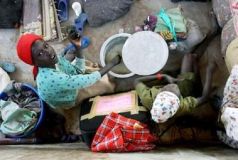UN plots airlift for some South Sudan returnees
March 11, 2007 (JUBA, Sudan) — U.N. officials in Sudan are planning the first major airlift to help tens of thousands of south Sudanese return home after years of conflict.
 “We’re looking to set up an air operation from Khartoum to Juba,” said David Gressly, the U.N. deputy resident and humanitarian coordinator for southern Sudan.
“We’re looking to set up an air operation from Khartoum to Juba,” said David Gressly, the U.N. deputy resident and humanitarian coordinator for southern Sudan.
“It allows us to bypass the wet season so we can return people throughout the year,” he added.
The 2005 peace deal that ended more than two decades of war between the north and south of Sudan was preceded by a yearlong ceasefire.
Return figures are notoriously unclear, but U.N. officials estimate some 400,000 people have been returning to semi-autonomous southern Sudan every year since then.
The government and the United Nations have planned for 300,000 assisted returns in 2007, but an equal number of people are expected to head home on their own, which could make this the biggest year yet for returnees.
Gressley said the planned airlift would be the first such operation of this scale to the south.
“We’ve found that it’s actually no more expensive to move people by air than to take people over land with all the protection support required to move people over a period of four to six weeks,” said Gressly.
South Sudanese politicians had initially been eager to bring most southerners home in time for a national census planned for late 2007, which will have implications for a planned election.
But Gressly said politicians have since expressed concern about the poor services that await returnees.
“There’s no point in spending lots of money on bringing people home just to have them turn around and go back because they find nothing available for them,” said Gressly.
Several movements are expected to begin in the next two weeks, said Mario Samaja, the head of the unit which coordinates the U.N.-side of the process.
Samaja said exact numbers to be flown out were still being reviewed, but could be in the range of 10,000 to 15,000 people.
The United Nations has said it will help 35,000 people return to the south from Khartoum, and U.N. agencies will also provide humanitarian assistance to another 115,000 people if the two governments of Sudan providing funding.
A delay would mean the returnees would have to be supported during the rainy season, during which time much of southern Sudan is impassable. Planting season will also be missed.
“People will come back too late for planting, so that means that we will have to feed them for longer, in many places they will not be able to build their hut and so will need a stronger injection of non-food items,” Samaja said.
The government of South Sudan has already spent much of the $25 million set aside for the return process on a fleet of 134 trucks. And officials say the U.N. operations may also find itself in financial trouble.
“We are in the shadow of Darfur. It a problem for us to keep the attention on the south, to keep the assistance flows coming in,” said Gressly.
(Reuters)
